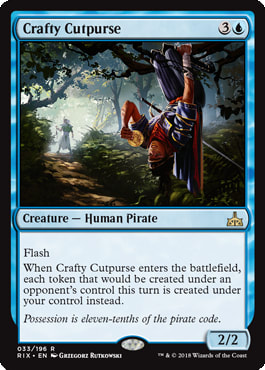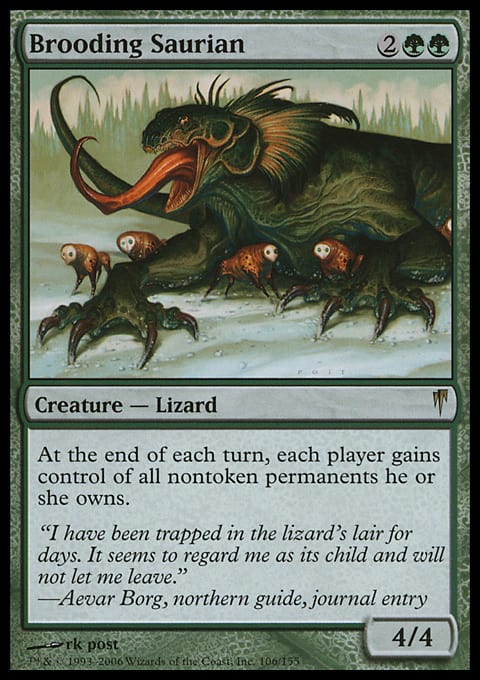Readers!
Without realizing it, I have been subtly giving advice about counter-counter-strategies for about a year. Now, that's not a bad thing. Countering counter-strategies is important and can sometimes be necessary for your deck to do anything. Your Enchantress deck scooping to Aura Thief or Merciless Eviction, your Pirate deck being confounded by Homeward Path or your extra turns deck having no plan for a Stranglehold can feel really bad and keep you from playing any kind of Magic. I don't like these scenarios, so I have been making suggestions on how to avoid being in that scenario. In a way, telling people to run countermagic or Nevermore for Merciless Eviction, Strip Mine for Homeward Path or not be the kind of person who plays extra turns decks to contend with Stranglehold, is third-level strategy. If what we want our deck to do is level one, how we stop them from stopping us is level three. Why don't I talk much about level two? I should.
You don't need me specifically to tell you about counter-strategies. However, I don't know that all of the ones currently being employed fit our 75% deck-building ethos. I don't want to suggest cards that feel like they're sideboard cards jammed into a maindeck to stomp one person in particular. When we think back to the 8 simple rules for 75% deck-building, we see that it has always been important in 75% building to aim to punish people for the plays they make rather than prevent them. My feelings on that have evolved a bit since then, and I think we should take a paragraph to talk about what that rule (they're not rules, really, they're guidelines, but I was making a pun about that John Ritter show for that article title) actually means to me and how my more mature view on it more accurately reflects how we should tackle building while still preserving the original intent of the guideline.
Originally, we came up with "It's better to punish someone for making a play than it is to prevent them from doing it" and I think that's close but not quite there. I think sometimes it's perfectly acceptable to prevent people from making certain plays ever. You never want people to blow up everyone's lands. You never want someone to take a bunch of extra turns. Preventing those plays can preserve a more balanced game and unless we're trying to unbalance it ourselves, we don't want the board tilted in someone's favor. A better way to phrase that guideline would be "It's better to punish someone for making a play than to prevent them from doing anything." We should absolutely prevent some things, but countering a Boil that is going to delete one player and leave the rest of the table unscathed isn't preventing them from doing anything, it's preventing them from doing a thing. A 75% deck isn't designed to win the game by making other players miserable. Early on, a reader submitted a deck for me to give the 75% treatment and he told me he made his girlfriend miserable with his Talrand deck because he countered everything she played. The lesson shouldn't have been "We shouldn't be countering spells" but rather "No one wants to be soft-locked." We want other players to play Magic and we expect to cheat so we play better Magic than them. There are better ways to win than by preventing them from having a turn. That rule wants us to play Arcane Laboratory instead of Forbid locking players, Kismet over Armageddon and Austere Command over Merciless Eviction.
We don't want to prevent other players from doing anything but there are still certain things we're not into. From a third-level perspective, I build a deck and keep in mind things that could cause the whole deck to unravel and plan for shutting those down. I run a lot more enchantments than most people so I have to plan for getting all of them exiled in a way that players who build a typical deck with like eight enchantments (cowards!) don't. If we want to be the player across from the player with a ton of enchantments but don't necessarily want to cast a spell that blows up one player's Rhystic Study, one player's Sylvan Library and one player's entire board from the game, what do we want in our hand instead? I think instead of thinking pro-actively, we need to think more reactively and plan to shut down particular plays out of the other players. In addition to thinking about how to counter cards that counter us, what does their deck do that we want to counter? Let's use the newest set, Commander Legends, for inspiration. There are a few things players didn't do as often before that they're going to be doing more now and we should think about how to stop them.
Making Tokens
Players are making more creature tokens than ever before, and sometimes they can get pretty scary. Cards like Biowaste Blob and Scute Swarm can take over the board if left unchecked and cards like Divine Visitation and Parallel Lives have been making the token problem a real problem for a long time. Cards with encore in Commander Legends can be pretty scary, especially with players using Sundial of the Infinite to keep the tokens around. In short, Commander Legends has introduced a bevy of new, powerful ways to put creature tokens into play - more than any one set before it, and players are going to be itching to try the new ones out. My solution?
Steal them! Cutpurse requires you to bounce or blink him to take care of long-term token production efforts, but tokens that come in a big burst can be snagged with no setup. It's much more satisfying to steal all of the tokens than prevent their creation. Cutpurse is underplayed in Commander, partially due to how clunky it is to have to keep re-buying the effect. Why a company would force you to keep blinking Cutpurse but let Hullbreacher be templated the way it is eludes me, but I think with so many new token generators, you're going to play this to great effect every game you draw it.
Taking Your Stuff
I'm advocating taking their stuff, I always do. I even think three layers deep and fret over ways our opponents can try to get their stuff back from us because the only thing more fun than taking an opponent's card is keeping it. For this exercise, let's think about the cards we hate having played against us and consider using them ourselves.
Brand in particular is a great answer in a lot of situations because it doesn't give every player their stuff back, something you might not want. It also has cycling in case no one is up to any shenanigans. Some of these can feel like sideboard cards, but they can keep you from being murdered by your own stuff and if you play 75% decks a lot, you're doing that to people and you basically deserve it.
Saurian is a card I NEVER see played, but I think it's worth a look, because it is very easy to tutor for Green creatures as "toolbox" answers and Saurian deals with another problem Commander Legends has given us....
I was passed a cooked grenade!
Blim, Comedic Genius and Inniaz, the Gale Force are two decks that are passing people permanents that will kill them. I have written about and built both decks and they are very funny. However, should you not want to die to a premature death to a card with "Lich" in the card's name, you will want ways to pass those nasty permanents back to the other player. I like Saurian a lot because it handles both cards like Inniaz and cards like Breeches, Brazen Plunderer. There are very few games these days where someone isn't stealing or donating something and being able to stop those shenanigans could keep you from losing. Use Worldly Tutor, Prime Speaker Vannifar, or Magus of the Order to find Saurian in a pinch and maintain order on the board. I run Strip Mine and Dust Bowl in a lot of decks to get around Homeward Path - I don't have a plan for Saurian. Stealing it won't work and I don't like to run a ton of removal because I want there to be creatures in play to steal. This would give my favorite decks fits and I'm not thrilled I came across it and told people about it.
"Obeka"
More than ever, players are using cards that end the turn to gain an advantage. Anything that expires "at the end of the turn" triggers on the end step, and players can use Obeka to turn Final Fortune into a Time Walk. Encore gets nasty, Sedris is getting dusted off and re-tried, and Threaten effects just got way better (I think? I'm not a judge). Obekananigans are going to be everywhere - Obeka has been the most popular commander from Commander Legends since it was spoiled according to EDHREC and I don't see its popularity waning at all.
If you are running generic counterspell effects, I'd recommend replacing a few with ones that have Stifle as a mode. I wouldn't run Stifle or Trickbind alone as a card, but Voidslime, Disallow, or even Sublime Epiphany are all good options. The blow to the Obeka player could range from dumping a bunch of Encore tokens they expected to keep to making them succumb to their own Final Fortune. If you limit the number of counters you run, consider ones with Stifle modes. I tend to prefer counters that stop them from harming my permanents but which I can't really use very effectively to foil their plans, or I use something like Desertion. However, Voidslime has always been one of my favorite cards and with a raft of new activated abilities that can really unbalance the game if their successful or blow up if they're not, you might want to swap plain old Alpha Counterspell or Dissolve for something that has a bit more versatility.
There are a few more things that Commander Legends is poised to foist on us, like Cascade, but the most important thing to remember is that we're not specifically trying to make a deck do nothing, merely make it not win. It's a tough tightrope to walk, but no one said building 75% was easy, merely that it was worth it. That does it for me this week, join me next week where I'll be discussing my own take on Obeka - don't miss it. Until next time!




























